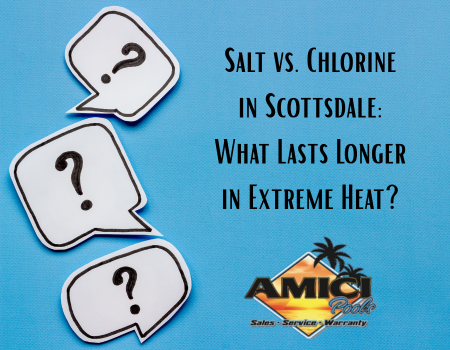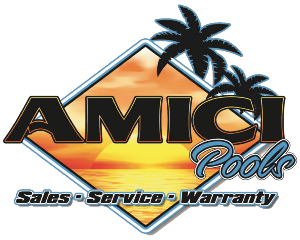Scottsdale, Arizona is known for its stunning desert landscapes, luxurious outdoor living, and long swimming seasons. But with extreme summer temperatures that routinely climb above 110°F, pool maintenance becomes a serious consideration. One of the most common questions Scottsdale pool owners ask is: Should I go with a saltwater system or stick with traditional chlorine?And more importantly, which one lasts longer under the harsh Arizona sun?
Let’s explore how both systems hold up in Scottsdale’s extreme heat—so you can make a smarter, longer-lasting choice for your pool.
The Basics: Saltwater vs. Chlorine Pools
 Before comparing durability, let’s briefly define each system:
Before comparing durability, let’s briefly define each system:
- Chlorine Pools: Use liquid chlorine, tablets, or granules to sanitize the water and kill bacteria. Chlorine must be manually added and monitored frequently.
- Saltwater Pools: Use a salt chlorine generator, which converts dissolved salt into chlorine through electrolysis. The system produces a steady stream of chlorine, eliminating the need for manual dosing.
While both systems ultimately use chlorine to sanitize the water, their delivery methods and impact on pool longevity differ significantly—especially in Scottsdale’s climate.
Scottsdale’s Heat: A Harsh Environment for Pools
Summer in Scottsdale doesn’t just mean sunbathing—it means sun blazing. UV radiation is intense, air temperatures often exceed 110°F, and water evaporation rates skyrocket. This combination creates a challenging environment for any pool sanitation method.
High heat and UV exposure have three major effects:
- Faster chlorine degradation
- Increased algae growth potential
- Higher water evaporation (which affects chemical concentration)
Chlorine Pools in Extreme Heat
Pros:
- Simple and widely available.
- Low upfront cost for installation.
- Easy to increase chlorine dosage quickly during algae outbreaks or heavy use.
Cons in Scottsdale Heat:
- Rapid chlorine burn-off: Direct sunlight and high temps break down free chlorine quickly. This means you’ll be adding more chlorine more often—especially in the summer months.
- More maintenance: You’ll need to test and rebalance the water more frequently to keep levels safe.
- Higher long-term cost: Because chlorine burns off fast, you’ll spend more on chemicals over time.
- Harsh on swimsuits and skin: In high concentrations, chlorine can irritate skin and eyes—especially under the blazing sun.
Verdict: While chlorine can be effective, it’s less efficient in Scottsdale’s extreme heat due to rapid breakdown and high maintenance requirements.
Saltwater Pools in Extreme Heat
Pros:
- Steady chlorine production: The salt cell continuously generates chlorine, helping maintain consistent levels—even when UV rays are trying to break it down.
- Softer water feel: Saltwater is gentler on skin, eyes, and swimwear.
- Lower chemical costs over time: Though you’ll still need to monitor levels, the system self-regulates, reducing the need for frequent manual chemical additions.
- Better long-term stability: Saltwater pools tend to require fewer major chemical overhauls in hot months.
Cons:
- Higher upfront cost: Installing a salt system costs more initially.
- Equipment wear and tear: Salt can corrode metal parts if the system isn’t properly balanced or maintained.
- Salt cell maintenance: The cell needs regular cleaning and eventual replacement (typically every 3–7 years).
Verdict: In Scottsdale’s extreme heat, saltwater systems tend to last longer in terms of maintaining balanced chlorine levels without constant re-dosing. They’re also more cost-effective over time if maintained properly.
Which One Lasts Longer in Scottsdale Heat?
If you’re talking chemical stability and maintenance efficiency, saltwater pools win in the long run. The continuous generation of chlorine helps offset the rapid degradation caused by UV exposure. Salt systems are particularly beneficial in regions like Scottsdale where maintaining a consistent chemical balance during long hot stretches can otherwise become a full-time job.
However, if you’re considering equipment durability, it’s a closer match. Salt can be corrosive if not managed properly, so investing in quality, salt-compatible equipment (like titanium heat exchangers or sacrificial anodes) is key.
If you’re looking for less hands-on maintenance, more consistent sanitation, and better comfort in Scottsdale’s extreme climate, a saltwater system is the more heat-resilient choice.
If you’re on a tighter budget upfront and don’t mind more frequent monitoring and dosing, chlorine can still work—but expect higher chemical use during the scorching months.
In either case, the key to longevity in Scottsdale’s extreme heat is consistent, professional-grade maintenance. Whether salt or chlorine, keeping your pool chemistry balanced and your equipment inspected will ensure your pool survives—and thrives—under the Arizona sun.
